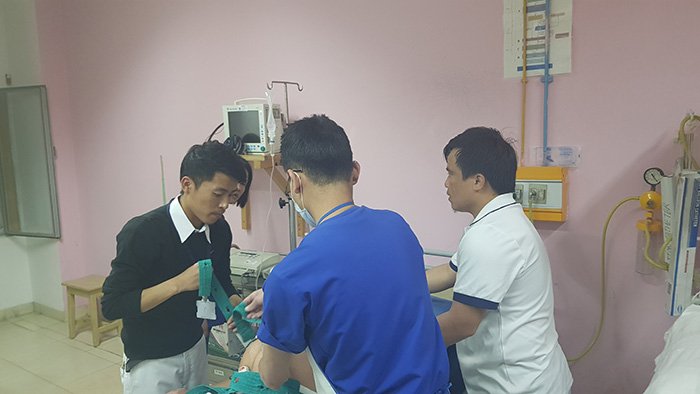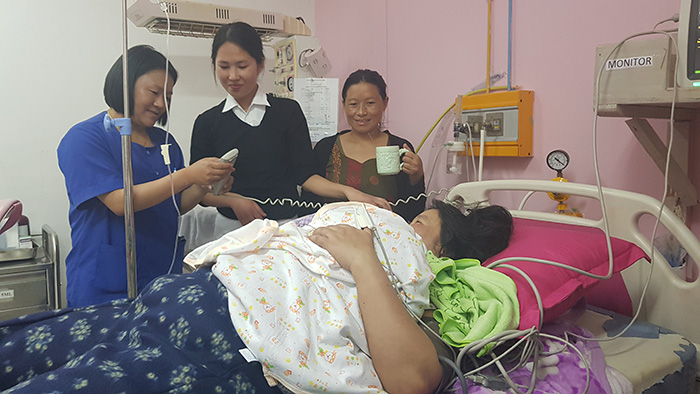Yeshey Lhadon
It’s a low-key affair at the national referral hospital in Thimphu. The nurses are today celebrating International Nurses Day. Normally, it is a big event, but not today.
Is there a shortage of nurses in the hospital? No. Nurses from other dzongkhags have come to build a team at the referral hospital to fight the impact of Covid-19.
This year is the 200th anniversary of Florence Nightingale, known popularly as the Lady with the Lamp, who in 1860 laid the foundation of professional nursing. The theme for the International Nurses Day is Nursing the World to Health. Moreover, the World Health Organisation has declared this year as the year of nurses and midwives in the wake of the coronavirus pandemic.
As Covid-19 scare increases, the Bhutanese nurses, especially in Thimphu, are doing more than what they normally do.
At the birthing centre in the hospital, it’s a noisy affair. Dirt and screams and crowd. After a long labour she gives birth to a little baby. The signs of success can be read on the faces of the nurses. There is a quiet celebration. This way, simply, what our nurses do are often swiftly and thanklessly forgotten.
In the Covid-19 days, the nurses are at the forefront of the battleground. But who knows what they really do?

Thimphu, being the biggest city and the capital, is often considered the zone of danger. The threat of pandemic is here bigger than anywhere in the country.
Radhika Subba and her husband cried tears of joy after the birth of their little girl. “We are grateful to the hospital, but more importantly to the nursing staff.”
Sangay Zangmo, a nurse, has lost track of the number of babies she helped deliver in nine years of her career. Often she has had to worry as much as the parents themselves if not more.
She said that the situation was often very intense in the delivery room. Nurses get abused verbally, often physically. “We put up with it. It is our job. Frustrations are there, of course.”
Pema Choki gave birth to her second child on International Mother’s Day—Sunday, May 10. She said: “The nurses here are thoughtful, kind and compassionate. They have helped, encouraged and motivated us during delivery.”
Dr Sonam Wangmo, a gynaecologist said: “Nurses are the backbone of the hospital. Doctors are mechanical. Love and care are given by nurses.”
Sheka Choden, a nurse, said that the nurses were less in number and so coping with stress was vitally important. “Nurses know a lot more than they often get credit for.”
The nurses in the medical ward are perhaps the busiest of all.
Sonam Zangpo, a nurse, starts with bed making and assessing patients. He does the same for 12 hours, sometimes even more. “We always need to be patient-oriented, listen to the patients. It is difficult and tiring but one must go on.”
Nurses in Bhutan have to multitask.
Dorji Penjore, a nurse, said some patients misunderstood the real definition of an emergency. Explaining is difficult. Some people just do not understand. “In the beginning it was difficult. Now I feel at home. I am happy with what I have to do now every day.”
At the dialysis unit, the relationship among nurses and patients is that of friends and family. One, they have to be together always. Two, the relationship between caregivers and patients can be understood only by patients and who come to them with advice, medication and an awful lot of love and compassion.
Sonam Diwari, 80, does dialysis twice a week. Among the nurses, he is a fatherly figure. He is loved and cared for well.
Richen, a nurse at the unit said: “I am proud that I can and have been able to make a difference in the lives of my patients.”
Tandin Pemo, nursing superintendent at the hospital, said that nurses were making sure that they do their best, especially at this time when that nation is faced with Covid-19.
“But there is no shortage. We have been able to handle it pretty well,” said Tandin Pemo.


